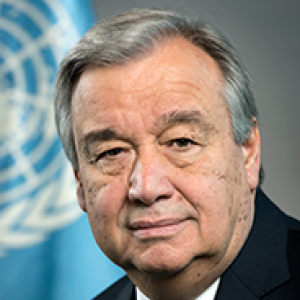Breakthrough agreement in Istanbul
22 July 2022
Today in Istanbul, senior representatives from Ukraine, the Russian Federation, and Türkiye gathered to sign an initiative which establishes a mechanism for the safe transportation of grain, related foodstuffs and fertilizer from Ukrainian ports to global markets
For months, the Secretary-General has been underlining the importance of facilitating full access to world markets for Ukraine’s food stocks and Russian food and fertilizers.
He travelled to Moscow and Kyiv in April to propose a plan to reach that objective.
Ukraine and the Russian Federation are breadbaskets of the world, producing almost one-third of the world’s wheat and barley and half of its sunflower oil. Russia is also a top global exporter of fertilizers and the raw materials for its production.
Today in Istanbul, senior representatives from Ukraine, the Russian Federation, and Türkiye gathered to sign an initiative which establishes a mechanism for the safe transportation of grain, related foodstuffs and fertilizer from Ukrainian ports to global markets.
The United Nations, represented by the Secretary-General, signed the Initiative as a witness. The purpose of the Initiative is to contribute to the prevention of global hunger, to reduce and address global food insecurity, and to ensure the safety and security of merchant ships entering or departing Ukrainian ports.
In the Initiative, the Parties recognized the role of the Secretary-General of the United Nations in securing the discussions for this Initiative. They went on to request his further assistance in its implementation, in the furtherance of the humanitarian mission of the United Nations, subject to its authorities and mandates.
To facilitate the implementation of their Initiative, the Parties agreed to set up a Joint Coordination Centre (JCC) in Istanbul, under the auspices of the United Nations, comprised of representatives of Ukraine, the Russian Federation, Türkiye and the United Nations.
The JCC will enable the safe transportation, by merchant ships, of commercial foodstuffs and fertilizer from three key Ukrainian ports in the Black Sea: Odesa, Chornomorsk, Yuzhny.
The new Centre will:
- Monitor the movement of commercial vessels to ensure compliance with the Initiative;
- Focus on export of bulk commercial grain and related food commodities only;
- Ensure the on-site control and monitoring of cargo from Ukrainian ports; and
- Report on shipments facilitated through the Initiative.
The new Centre will not:
- Facilitate the export of food from countries other than Ukraine; and
- Facilitate exports of containers and non-food items not included under the provisions outlined in the Initiative.
An agreement was also reached with the Russian Federation on the scope of engagement of the United Nations to facilitate the unimpeded exports to world markets of Russian food and fertilizer – including the raw materials required to produce fertilizers. This agreement is based on the principle that measures imposed on the Russian Federation do not apply to these products.
Simultaneously, the Russian Federation has committed to facilitate the unimpeded export of food, sunflower oil and fertilizers from Ukrainian controlled Black Sea ports.
Agreements to facilitate unrestricted access to exports of Ukraine food from the Black Sea along with exports of food and fertilizer from the Russian Federation matter on many levels.
To calm commodity markets, lower prices and provide critical relief to the most vulnerable people and countries getting hammered by an unprecedented cost-of-living crisis.
To the numerous countries in the developing world that rely on wheat and other grain imports to feed their people.
And to assist in reversing the turmoil in the global fertilizer market that is now threatening next season’s crops – including rice, the most widely consumed staple in the world.
The comprehensive agreements secured today in Istanbul are a big step forward in tackling the global food crisis now gripping the world.
They will provide much-needed relief to the most vulnerable people and countries.



